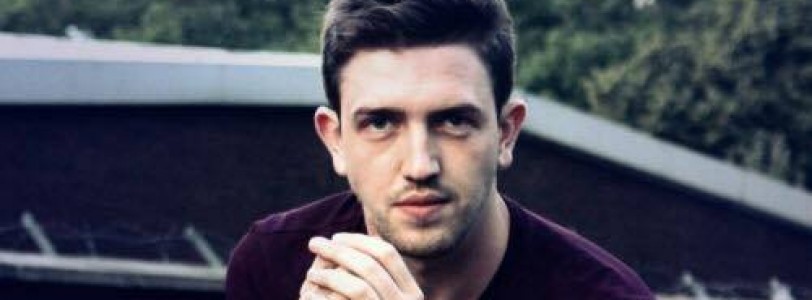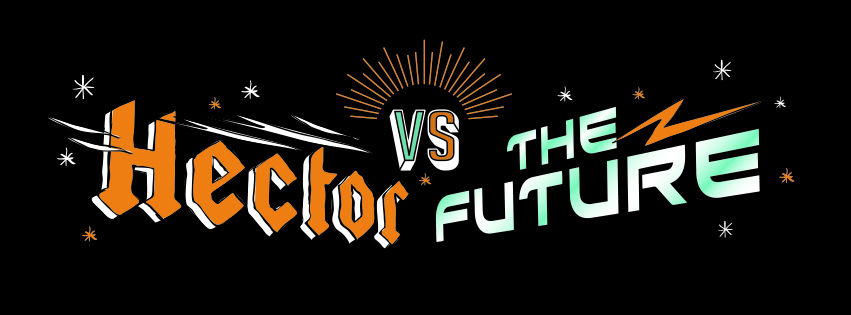Can you first introduce yourself for us please?
Hi I'm Andy Goddard, I'm the producer and director of Hector vs the Future.
How did you get into audio production?
Like a lot of people, I got into it at university. I joined a comedy society and partly as a product of being a musician but mostly out of sheer laziness, I preferred making audio comedy to all that bother of running around gigging all the time.
What does a producer do?
Depends on the production and the context. With this show it was a case of facilitating and providing a level of editorial steering.
Generally, your job as a producer is to channel your show towards the market you expect to listen to it while preserving the writers vision as much as possible. In addition to this, you're generally the one who decides who does what. So for me that's sourcing composers, directors, editors, sound recordists, stage managers, generally anyone who is going to touch the production in some way.
With the nature of our project, that being a low-no budget podcast recording, sourcing people often just means doing it yourself. My strengths are as a director, sound designer and editor so I am doing all of those and bringing in others for everything else.
What is a podcast?
It's like speech radio but on the internet. You download the file rather than script it. A bit like Netflix but for radio.
What work goes into recording a podcast?
It's broadly similar to any kind of broadcast program, you have to prepare what you're going to put in the show, record it, and then make it listenable through editing afterwards. With podcast it's also advisable to put considerably more effort into additional content such as illustrations and articles about the show. There are few entities online which have a reliable returning audience who shows up to see what's there so you have to grab the audience's attention through non-traditional means.
What was it like working on Hector Vs The Future? How did it compare to other work you've done?
It was a great deal of prep compared to my other main big show Wooden Overcoats. The difference is between recording live and in studio. When it's live you get one shot to get it right so it has to be nearly perfect before you go in. In studio you can stop people halfway through scenes and tinker away until you have the product you want. Hector being a live show made it a very different beast. It was definitely more stressful but I can only think of Hector as a live show. It wouldn't be nearly as good any other way.
What is it like working with James?
Which James?
Huntrods: An absolute pleasure, he's a keen collaborator and an excellent writer. He's also very willing to get stuck in on the nitty gritty which is important when you're making a show out of shoestrings.
Hamilton: one of the hardest working people I've come across. Working with someone like him makes you raise your game to try and match his effort. There is no way this would have come together without his grit, determination and talent. I'd work with him again in a heartbeat (make that 2 heartbeats, I need a breather).
How much creative input did you have on the script?
Initially quite a lot, we had a lot of back and forth on the first couple of episodes defining the characters and the direction of the show. As it went on I needed to do less because we were on the same page about most things. The same is true for the direction, as your creative team settle into what the show is about, I find it's best to have a light touch and only intervene heavily when it's going somewhere you don't think the audience will respond to.
Is recording a 'chatty' podcast different from recording a radio style sitcom?
Totally.
A chatty podcast is an essentially low maintenance product. You take clever funny people, make them chat about something and then cut out all of the ums - ahs and legally dubious sentences.
A sitcom is a crafted piece of art. You are building a world as much as telling a story.
The key difference here is in the preparation. The recording for a sit com may even take less time than for a chatty podcast but the prep that goes into it is into hundreds of hours as opposed to a couple of hours down the pub with a laptop.
What equipment did you use to record Hector Vs The Future?
I used a zoom R16 multitrack recorder, 5 SM58s (for the actors), 2 Rode shotgun mics (for the audience) a zoom h4n for field recording sound effects and a variety of other kit for sound design work.
What was the biggest challenge when recording Hector Vs The Future?
Not killing James Hamilton
Conversely, what did you enjoy most?
Killing James Hamilton
Having finished recording the series, looking back, are there things you would approach differently?
I'd like to say I'd have given it more time.
You can only learn how intensive working with people is going to be on the job. I know that I work best under pressure but there's a limit to that. We didn't exceed that limit with Hector but it was probably the first time in my career where I really pushed that boundary. We did a hell of a lot of work in not a lot of time.
I say I'd like to say that because I probably will do the same again. Work always expands to fit the time available.
What are the big costs involved in producing a podcast?
Venue is a huge one. If you want somewhere that is going to provide the tools you need to get the product you want, you're probably going to have to shell out for it.
That said, not every podcast is obsessed with sound quality in the same way I am. It's worth looking at Dave Pickering's work on this. He's convinced there's an authenticity to bad sound that you don't get when things are tightly produced.
My view is that if you make something slick, you aren't going to alienate audience members who like things to sound nice. There's different approaches. Pick your own! His is cheaper though.
How, especially when it's difficult to monetise a podcast, do you ensure it stays affordable?
The short answer is that you don't. Don't get into podcasting unless you:
a. love it
b. have money to set fire to that you think would be better used making audio
c. have an ulterior goal to podcasting.
I love making comedy and I love it when people actually see what I make. I have enough money to live on despite plunging a fair percentage of it into what I do and everything I do in podcasting makes people in the broadcasting world think I'm more employable. So I have all three of those ticks.
That said, you should be very careful when you enter a project to know the limits of your budget. If you've literally only got a tenner, spend it on a mic and record your mates. If you've got a bit more flexibility, go up from there but only if you're able to.
Podcasting is not at the point yet where there is a structure for you getting your money back so if you need it, for God's sake don't spend it. At the moment the system is: make something brilliant and then advertisers will come to you. And there is no guarantee that even if you make something brilliant that people will listen to it.
It really is the wild west of private sector broadcasting, do it for fun before you do it for money.
What advice would you give to young people who are similarly interested in audio production?
Make stuff.
Stop talking about making stuff, you're wasting creativity.
Get a mic, get some paper, write what you're going to say and say it.
It doesn't matter if it's crap. As a wise bloke once said to me on an allotment: s**t makes the best fertilizer.
Could you give a brief runthrough of the absolute basics of recording a podcast?
You need a device that will record audio, you need to make sure that it's recording at a level that is loud enough for the recorder to write good quality files at, and then you need to have something to say into the microphone. The last bit is really the most important and hardest bit. If you can't get your head around recording it, call people until you find someone who does.
Do you think podcasting is now mature as a medium, or are there still ways it can develop?
Podcasting at the moment is like the BBC was in the 30s and 40s but without any of the money. It's people firing off mad ideas with no regulation and seeing what sticks. It's absolutely brilliant and I hope it never changes.
Podcasting is good precisely because it's immature. What will happen next most likely is that money will enter the game and people will experiment less. Then I will say it's matured and I'll have a little cry because it won't be as good anymore.
Where can people find more of your work?
Follow me on twitter @soundofagoddard I'm on soundcloud as well as Andy Goddard and you should go to http://www.woodenovercoats.com/to check out my other sitcom. It's brilliant.
And where can people find out more about you?
http://www.stuffthattalks.wordpress.com/
And now I've written that, I will actually go and update that website.










0 Comments